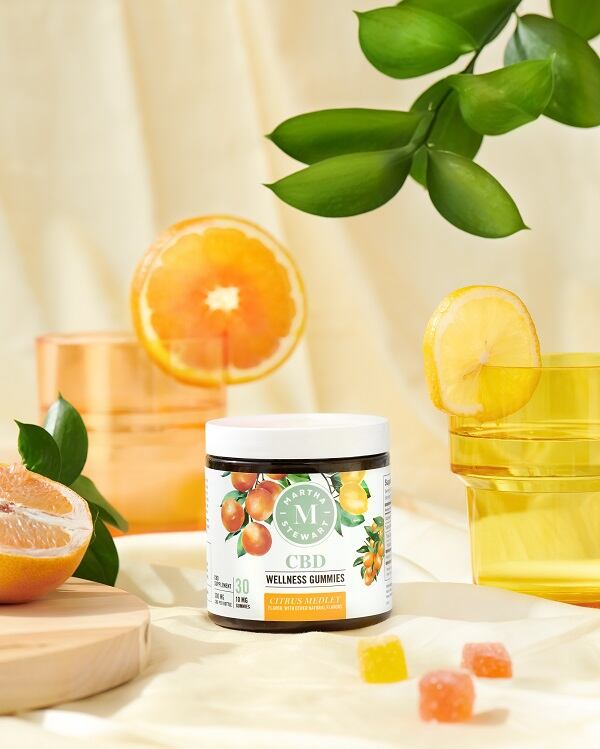Canadian cannabis company Canopy Growth launched its highly anticipated CBD collection with Martha Stewart Thursday, adding yet another brand to its expanding portfolio of U.S. CBD products.
"We bring what I think is best-in-class industry science and research to create really effective, high-quality, safe products. And Martha brings that connection with the consumer and the ability to create amazing flavors, as well as an appropriate value proposition for the consumer set," Canopy Growth CEO David Klein told Cheddar.
At launch, the collection includes "wellness gummies," soft gels, and oil. The 10 mg CBD gummies come in two Martha-approved flavors — citrus medley and berry medley — and retail for $34.99. The soft gels contain 25mg of CBD and retail for $34.99. The 750 mg tincture comes unflavored or in blood orange or meyer lemon, and retails for $44.99. Consumers can purchase the products online before products roll out in brick-and-mortar retail shops later this year.

"The thing that's great, though, about what Martha brings to the market is she's personally tested the products to make sure that they meet her standards," Klein said.
The launch of Martha Stewart CBD comes more than a year after Canopy Growth announced its partnership with the lifestyle maven in February 2019. The announcement came amid a flurry of celebrity partnerships for the cannabis giant — among them collaborations with comedians Seth Rogen and Evan Goldberg, as well as with singer and songwriter Drake.
Klein, a consumer packaged goods (CPG) veteran who spent 10 years at alcohol giant Constellation Brands, said that partnerships between consumer packaged goods companies and social influencers or celebrities can be hit or miss. What brings value is authenticity.

"I think what really works is when the celebrity engages," Klein said. "Martha has been teaching people how to live well for her entire career and she is personally involved in all of the activities related to our products. We get her expertise, she gets our expertise, and then she gets to go speak about our brands in a way that's authentic."
The burgeoning CBD market is projected to reach some $20 billion in sales by 2024, according to BDSA, which is lucrative in and of itself. But for Canadian cannabis companies, it also represents a very strategic play to establish a footprint in the U.S. Since marijuana is federally illegal in the U.S., Canadian companies trading on major U.S. exchanges cannot legally deal in it stateside — but CBD offers a perfectly legal route to establishing infrastructure, distribution, and retail relationships.
Canopy Growth has several brands in the U.S. already, including BioSteel, a popular sports beverage and supplement brand that boasts numerous partnerships with high profile teams including the Brooklyn Nets and USA Hockey; and This Works, a CBD beauty company.
Canopy also has a unique acquisition agreement with U.S. cannabis multistate operator Acreage Holdings. A ground-breaking $3.4 billion deal when it was announced, the acquisition underwent a complex renegotiation in June to adjust for changes in the market that have dragged on both companies' stock. The new deal still values Acreage at about $900 million, according to Cowen analyst Vivien Azer. It also represents a commitment on Canopy's part to acquire Acreage in spite of financial troubles that have left it strapped for cash.
"As part of this restructuring, they have agreed to focus their business, they have agreed to bring in a new CEO … someone that's really laser-focused on driving operations where they exist today," Klein said. "We think that with that bit of strategy shift on Acreage's part, they are still a very strong partner."
Acreage already has introduced some Canopy brands like Tweed flower into the U.S., but the actual acquisition is still contingent on federal legalization or federal permissibility of cannabis. It's a possibility that looks more likely following news the Marijuana Opportunity Reinvestment and Expungement (MORE) Act will head to a vote on the floor of the House of Representatives later this month, although advocates expect the bill will run up against opposition in the Senate.
Even if the White House flips to the Democrats after the 2020 presidential election, cannabis legalization isn't a sure bet. Former Vice President Joe Biden fell short of embracing adult-use cannabis legalization but did come out in favor of medical cannabis legalization, decriminalization, and rescheduling. Even so, Klein said the momentum toward legalization that the MORE Act's progress represents is promising.
"It's really just about time. Alcohol prohibition was repealed 87 years ago in the middle of a recession. We're sitting here today in a world that is trying to figure out how to create revenue for the government post-COVID, and create jobs in a time when we have massive unemployment, and also address some social justice issues that are really pervasive in our society," Klein said. "We see cannabis legalization as a way to help in all of those areas."



